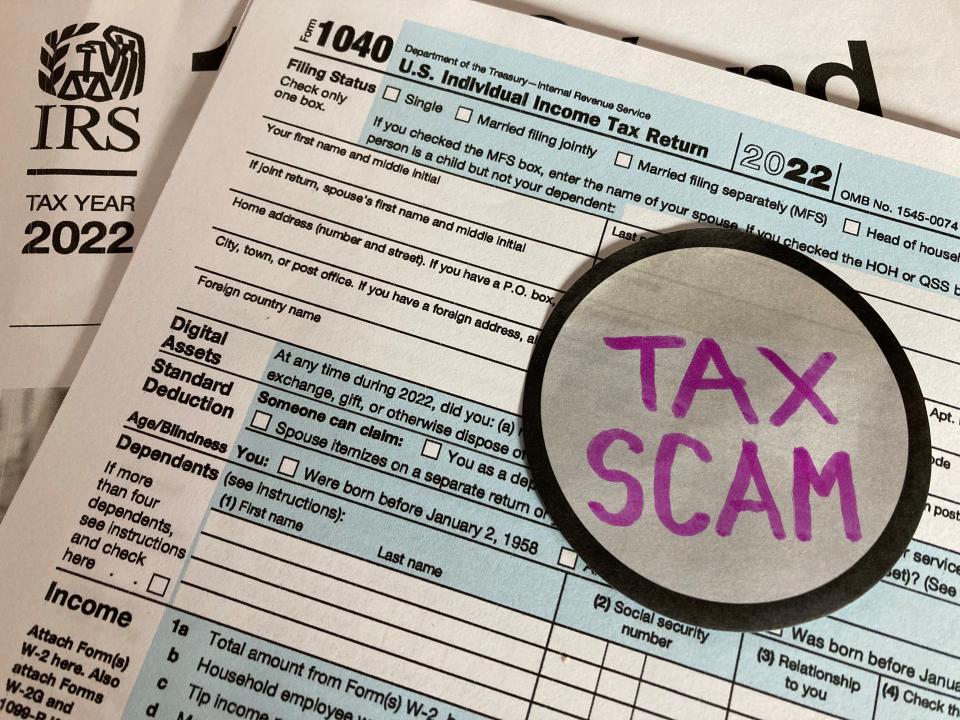Don’t get cleaned out by the Dirty Dozen | Jimmy Rodefer
The IRS has finished releasing its 2023 Dirty Dozen tax scams, used by criminals and scammers to inflict financial loss on Americans. If knowledge is power, knowing about the Dirty Dozen is a cleanser that can keep them from cleaning you out.
The double-barreled danger to taxpayers from the Dirty Dozen is that they could be cheated out of money and still be responsible for paying taxes owed, plus potential penalties, or face possible legal action.
The 12 most-offending 2023 scams labeled as the Dirty Dozen are:
∎ Employee retention credit claims: Promoters approach business owners ineligible for the tax break with pitches on how they can supposedly profit from the ERC. Ads for these pitches have appeared on radio and television, and the IRS says what they offer can be based on inaccurate eligibility information or ERC computation.
∎ Phishing and smishing: These are phony communications from people posing as legitimate financial or tax professionals or official agencies, including the IRS or state governments. Messaging may be unsolicited text messages (smishing) or email (phishing). The goal: entice recipients to give up personal and financial information to help the senders commit identity theft.

∎ Online account help from third-party scammers: Third parties offer to create an IRS online account with the taxpayer needing only to provide them with personal information – which will then be used for identity theft. Set up an account yourself at IRS.gov.
∎ False fuel tax credit claims: This benefit is aimed at farming use and off-highway business. Dishonest tax return preparers and promoters seek to help people fatten their refunds by claiming the credit, for which they’re ineligible.
∎ Fake charities: A natural disaster strikes. Suddenly, “charitable” organizations no one’s heard of seek donations to “help” disaster victims, but the swindlers are only after money and personal information. Taxpayers lose the money they contribute and can’t seek tax deductions, which are allowable only for contributions made to an IRS-recognized tax-exempt organization.
∎ Unscrupulous tax return preparers: These are tax preparers who go beyond lawful means of reducing tax liability and for personal gain encourage taxpayers to push legal boundaries. Among their tactics: basing fees on refund size, and refusing to sign their work or include their required IRS Preparer Tax Identification Number.
∎ Social media: Fraudulent form filing and bad advice. A well-known saying goes: “A lie gets halfway around the world before the truth can put its pants on.” The internet reduces that time to a keyboard click. Relying on social media posts for tax information is inherently dangerous. Any source that leads to a false or inaccurate tax return should be avoided like an angry rattlesnake. The taxpayer is always responsible for his return.
∎ Spearfishing and cybersecurity for tax professionals: Spearphishing is a cyber-term for trying to obtain via email personal information about a business or its employees. Tax professionals are to take particular caution because a breach can expose client data and enable thieves to prepare fraudulent returns in clients’ names.
∎ Schemes aimed at high-income filers: The higher the income, the bigger the target. Two potentially abusive schemes are charitable remainder annuity trusts and monetized installment sales. A CRAT is an irrevocable trust enabling asset donation to charity while the donor receives annual income for life or a specified period. However, CRATs are sometimes used to try to eliminate ordinary income tax, capital gains tax on a property sale or both. A MIS occurs when promoters concoct – for a fee – a sale for taxpayers trying to defer recognition of gain on the sale of appreciated property.
∎ Bogus tax-avoidance strategies, Micro-captive insurance arrangements and syndicated conservation easements: Regarding MCIAs, the IRS warns of “implausible risks, failure to match genuine business needs and, in many cases, unnecessary duplication of the taxpayer's commercial coverages.” SCEs donated at fair-market value to an IRS-qualifying charity may be eligible for a tax deduction. However, the problem is when promoters seeking a fee lead taxpayers into illegal schemes that include inflated tax deductions.
∎ Schemes with international elements: Offshore accounts and digital assets (concealing for tax purposes assets hidden in offshore accounts and cryptocurrency accounts); Maltese individual retirement arrangements misusing the tax treaty (contributions for foreign retirement accounts to avoid U.S. taxes); and Puerto Rican and foreign captive insurance (which may not have the characteristics of legitimate insurance).
Strategies that operate within the law are valid ways to reduce tax liability, but mass-marketing pitches for sketchy approaches may, and often do, promise unrealistic results from tactics that are outside the legal lines – and within the focus of IRS scrutiny. Your best protection is through working with a trusted CPA, a professional on whom you can depend to handle tax matters with integrity and with your benefit and protection in mind.
With respect to the Big 12, the it pays to stay alert for the 2023 Dirty Dozen scams. There are a great many sharks in the water, and they’re hunting for your money.
Jimmy Rodefer is CEO of Rodefer Moss & Co., a two-state accounting firm with headquarters in Knoxville. Contact him at https://rodefermoss.com/knoxville.html.
This article originally appeared on Knoxville News Sentinel: Jimmy Rodefer: Don’t get cleaned out by the Dirty Dozen

